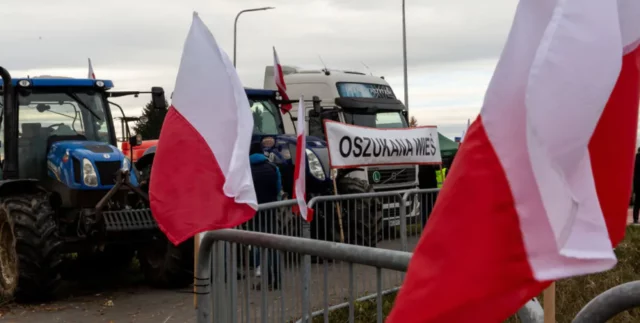Polish Farmers Initiate Major Strike, Impacting Ukrainian Border Crossings
In a bold and impactful move, Polish farmers have declared a large-scale strike that will significantly disrupt several border crossings with Ukraine. This action comes after increasing frustrations over European Union agricultural policies. Imagine being stuck in traffic for hours, only to learn that it’s a protest rather than just a regular jam—this is what travelers and businesses can expect starting today at 10:00 AM Kyiv time. Farmers will begin halting traffic at the Ukrainian checkpoints of “Yahodin,” “Shehyni,” and “Rava-Ruska,” allowing only limited passage for trucks: just one truck per hour in each direction at the first two points, while the Rava-Ruska crossing will permit two trucks per hour during daylight. These restrictions are set to impact not only the flow of goods but also everyday travel.
Further Restrictions on Trade
The situation is poised to escalate even further. Following the initial phase of the strike, farmers plan to restrict access for cargo vehicles at the “Ustyluh” and “Uhryniv” checkpoints. While passenger vehicles and buses will still be allowed through, trucks weighing up to 7.5 tons will be capped at just three vehicles per hour in each direction. This level of restriction is bound to create ripples beyond national borders, putting a strain on supply chains and agricultural exchanges that many businesses rely on.
Farmers’ Grievances Unraveling
The farmers’ discontent stems from EU policies that they believe have made it too easy for foreign agricultural products to flood the market. This isn’t just a minor complaint—it’s a matter of survival for local farmers who feel they’re losing out to imported goods. According to recent studies, nearly 65% of Polish farmers believe that these policies have adversely affected their livelihoods, leading to calls for urgent reforms and action. Imagine pouring years of hard work into your farm, only to see prices drop because cheaper products from abroad have taken over. It’s a heart-wrenching predicament, one that many can empathize with.
Now, there’s another level to this unfolding drama; Ukrainian border guards have been alerted by their Hungarian counterparts about planned protests along the route to the “Zahon” checkpoint. Although there’s no intention to block this route, the anticipation of demonstrations could further complicate movement across borders. For families and businesses alike, this situation is a recipe for frustration and uncertainty.
The Bigger Picture: Economic Implications
This strike is more than just a localized issue; it underscores a growing discontent regarding agricultural importation policies. The implications could ripple through both Polish and Ukrainian economies, which heavily depend on agricultural exports and imports. According to the Food and Agriculture Organization, agricultural trade makes up over 8% of Ukraine’s GDP and is equally vital for Poland, which exported over €12 billion worth of agricultural products last year. A disruption in this trade could lead to increased prices for consumers and reduced availability of products on store shelves.
As we observe these developments, it’s crucial to recognize the stakes involved. Farmers are not only voicing their grievances; they are pushing for a future that ensures fair competition and stable livelihoods. It’s a fight for survival that resonates with anyone who values local produce and the hard work that goes into it. Let’s keep our eyes on this situation as it unfolds and consider supporting local farmers in any way we can. After all, we all share a deep appreciation for the food that nourishes our lives.





